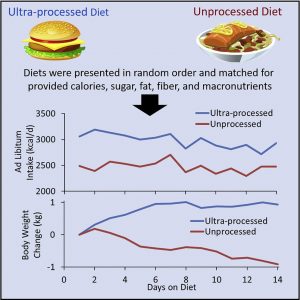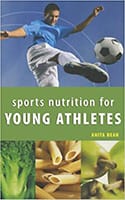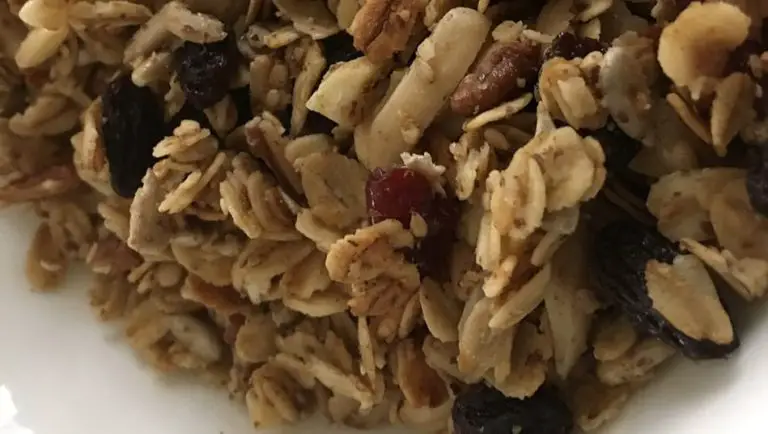Nutrition for Young Athletes (A Guide for Parents)
Athletics teaches kids a work ethic, leadership, teamwork, self-esteem, and so many other things. The positive life experience of a young athlete profoundly informs their future in remarkable ways both psychological and physical. Most athletic kids are happy, healthy, and successful in life, and that’s what we want for our kids.
That’s why we parents are willing to spend the money and the time driving our kids to practice and games, sitting on uncomfortable bleacher seats, or in a field on a hot summer day. Because we know that sports enrich our children’s lives, make them healthy and stronger, and more equipped to face the challenges of life.
Of course, it goes without saying that proper nutrition is essential for all kids, whether or not they are involved in sports. If you want to right by your kids, proper nutrition for your young athlete is essential.
The amount, composition, and timing of food intake can profoundly affect sports performance. Good nutritional practices will help athletes train hard, recover hard, and adapt more effectively with less risk of illness and injury. Athletes should adopt specific nutritional strategies before and during competition to help maximize performance.
From the International Olympic Committee 2003 Consensus Statement on Nutrition
Table of Contents
Young Athletes Need Parental Guidance on Healthy Eating
We live in a culture with some pretty unhealthy food habits, and it can be hard to make sure a kid is eating right, especially as they get older and the influence of others becomes more prominent.
That’s why it is so important to instill healthy habits from a very young age.
It always irritates me when adults reward their kids with pizza and soda, cupcakes, or candy after a game or practice. Aren’t we trying to instill healthy habits in these kids?
Everyone loves pizza, soda, and cupcakes. I sure do. But we are really blowing it when we feed junk to our kids all the time, especially as a reward for sports participation.
We should be promoting healthy dietary habits to our kids.
Kids need a parent’s guidance to make good food choices, and to learn to make positive healthy choices. impact the rest of their lives.
Ultra-Processed Foods and Obesity

A recent study by researchers at the National Institutes of Health found that eating all that processed foods found that all that processed food that makes up most of the American diet has played a huge part in our collective growing waistlines.
Click the link above to see the actual report, or read the excellent article about it on npr.org: It’s Not Just Salt, Sugar, Fat: Study Finds Ultra-Processed Foods Drive Weight Gain
What is Healthy Eating for a Young Athlete?
It’s pretty simple really: eat real food. Not the food-like substances that have come to dominate the Western diet. Ditch the chips, fast food, and all the convenience food that takes up way too much space in the grocery store, just real food.
This can be difficult in our culture. Your kids may ask “All the other kids are eating Doritos, candy bars, and drinking gallons of soda, why can’t I?”
So we have decided to create a section on the My Junior Allstar website to help parents understand how to feed their kids well, athlete or not, making them healthier, better athletes, and happier humans.
Over the next several weeks we’ll be adding easy-to-make healthy kid-friendly recipes, so you can feed your Junior Allstar right.
It’s important that all kids get their essential nutrients and a wide array of vitamins and minerals. More active kids will need more to maintain a high level of activity.
Essential Nutrients for Athletes
There are several nutrients that child athletes need to replenish often.
Calcium is crucial for anyone doing any sort of exercise, but especially for children who are spending a great deal of time exercising. It strengthens bones and helps to prevent fractures which can result from stress on the bones during extensive activity.
To maximize your child’s calcium intake, make sure they get enough dairy products like milk, yogurt, cheese, and leafy greens.
Iron carries essential oxygen throughout the body. An iron deficiency can be very dangerous for children, especially child athletes. A lack of iron can cause dizziness, fatigue, weakness, and shortness of breath.
Many of these symptoms may go unnoticed or may be thought to be a normal result of extended exercise and activity.
In order to avoid an iron deficiency, make sure your kid gets enough iron-rich foods in their diet: lean meats, salmon, eggs, leafy greens, and whole grains.
Carbohydrates get a bad rap from a lot of diet plans, but for young athletes, carbs serve a different role and are actually a crucial part of a balanced diet.
But not all carbs are created equal. There are 2 basic kinds:
Simple Carbohydrates are natural in fruits and milk. They are also found in processed and refined sugar products – like candy, soda, etc. The body breaks down simple carbs very quickly to be used for energy. The problem is that if kids eat too many simple carbs they end up with sugar spikes in their bloodstream. This can lead to all sorts of health problems.
Complex Carbohydrates are in whole grains, starchy vegetables, rice, breads, and cereals. I am not talking about the sugar-laden cereals that make up the majority of products in the grocery store. Many of those are refined and processed and just not healthy.
Whole grains are hands down the best way to get those complex carbs. Complex carbs are broken down slowly which makes it easier for the body to regulate them avoiding those unhealthy sugar spikes.
Carbs should be introduced throughout the day in the form of whole wheat toast and cereal, whole grains in pasta and bread, brown rice, fruit, and vegetables. Including these types of carbs will provide a healthy source of fuel that is important for child athletes.
Protein – We Americans typically get more than enough protein. Typically more than we should. Yes, there is such a thing as too much protein, which can be just as detrimental as not enough protein.
A lack of protein can make it difficult to gain muscle and can lead to fatigue and weakness, but too much protein can cause dehydration and loss of calcium in the body.
The best way to balance protein intake is to balance the entire diet, by providing fish, chicken, beans, and nuts interspersed with fruits, grains, veggies, and dairy.
The proper balance of protein in the diet will keep the muscle-building and repair process in check and will help your child grow strong and healthy.
Each child is different, but on average athletes require .5-1.0 grams of protein for each pound of body weight. This varies greatly based on activity level and type, so for more specific advice, consult a nutritionist or sports dietician.
And of course, good sources of protein are lean meats, chicken, fish, eggs, dairy, nuts, and soy.
Important! Don’t give your kids protein powder or other supplements, they can get all they need from food. Supplements can lead to an excessive protein intake which is hard on the kidneys and promotes dehydration. And you really never know what’s in them as there is no real regulation.
Avoid Added Sugar

As a society have an unhealthy relationship with sugar. Foods with added sugar tend to be low nutrition and high calorie and are a major reason for the rise in obesity in the last couple of decades.
There is added sugar in so many things, products you would never expect. I was shocked to realize there is added sugar in what was my preferred brand of organic broth. It’s all of them: chicken, beef, even vegetable broth!
Don’t believe me? Take a walk around your grocery store and read the labels. I’m sure you’ll be as surprised as I was to find it in so many grocery products. Added sugar is everywhere.
Do yourself and your children a favor and don’t keep soft drinks and sweets around the house! Instead, promote healthy options. Drink more water, and eat more fruit, This includes fruit juice, which can be very heavy in sugar. Try to avoid all of those processed products with added sugar.
Proper Hydration
For children, dehydration can be extremely dangerous, and some kids are definitely not the best at staying hydrated either! It is up to parents to make sure that they are constantly taking in fluids, especially if they are athletes.
Once again, avoid those sugary drinks. Sports drinks can be ok after vigorous activity to restore electrolytes, but as I like to say there’s nothing wetter than water. That one gets my daughter’s well-practiced eye-roll, but it’s true. Make sure those athletic children have their water bottles handy.
Training and Off-Season Nutrition for Young Athletes
Regardless of the season, healthy eating should always be a priority. It is ineffective for athletes to eat well during training and games and then eat poorly during the off-season.
The “yo-yo” effect of this type of diet can have severe negative consequences on overall health and may lead to nutrient deficiencies and overall weakness. In order to maintain excellent health and nutrition year-round, it is best to maintain the same meal schedule.
Generally, young athletes should eat 5-7 smaller portions throughout the day, rather than 3 full meals.
Having a small breakfast, morning snack, small lunch, afternoon snack, and small dinner is the best way to prevent blood sugar spikes or falls, and eating every three hours will also maintain a higher energy level throughout the day at school all the way through practice, meets, and training.
Every meal should contain a mix of protein, veggies, fats, carbs, and fruits, whereas snacks should at least have carbs, protein, and fat.
All of these meals and snacks should include healthy fluids, specifically water, and milk. Even when child athletes are not actively exercising, they should still be drinking plenty of fluids in order to avoid dehydration.
Game Day Nutrition
You’ve stuck to a nutritious, balanced diet for your family. You’ve meal planned and provided snacks, balanced protein, and iron and carbs. You’ve been encouraging your child to drink fluids. Now, it’s game day. What do we do?
Fortunately, if you have been following nutritional guidelines, you don’t have to change much on game day. For breakfast, some low-fat yogurt, fruit, and granola can be a great way to kick-start your child’s metabolism and provide energy.
It’s recommended that athletes do not eat big meals less than 3 hours before a game, as they will likely get an upset stomach if they are digesting while exercising.
The best course of action is to have them eat a meal that has healthy carbs and protein with low fat 3 hours or more before the game, and then if they are still hungry, provide a snack such as fruit and crackers that will be light on their stomachs but will provide fuel for the game. They should also be consuming water every 10-15 minutes during activity to avoid dehydration.
After the game, it’s time to focus on replenishing the nutrients that have been spent. Within the first 30 minutes after high activity, athletes should consume carbs, and again 2 hours later.
Fluids need to still be pushed to replenish electrolytes and energy. Any meals after a big game should contain equal amounts of protein, carbs, and healthy fats.
Every child is different, and therefore every nutrition plan will be unique. Some child athletes need more fuel for long-term energy burn, others for short bursts of energy such as sprints. However, throughout training, games, and the off-season, it is important to provide a strong nutrition base to keep children healthy and strong.
Providing the right balance of protein, iron, calcium, carbs, and fluids will keep your young athlete performing at their best, building muscle, and moving to the championships.
Easy Game Day Granola Recipe

A Delicious and Healthy Snack
Instead of processed commercial cereal that’s loaded with sugar, try this healthy and easy-to-make granola. Great in a bowl with milk, or just eat as is for a snack on the go. Your young athletes will love it as much as mine do.
Meal Plans for Kids
Professionals have strict meal plans and nutritional regimens that they follow to make sure they are playing at full strength. These players dedicate themselves to a diet so that they are able to contribute every time they hit the field, court, or ice.
Those in youth sports can learn from these players and their nutritionists as well, as their knowledge is second to none. Because many parents aren’t trained dietitians, the following guide and resources can help you get started on a meal plan for your own junior all-star!
Benefits of a Child Athlete’s Meal Plan
When properly done, a family meal plan can save time and money, and result in a much healthier diet. Here are the benefits:
- Less Eating Out– eating at home is cheaper and restaurants, fast food especially, use much more salt and oils than home-cooked meals.
- Complete Food Pyramid– only the parent knows what your kid’s entire diet looks like, so it’s up to you to balance each section of the food pyramid.
- More Regular Eating– fewer than half of children eat 3 square meals a day, and doctors recommend 3 meals and at least 2 snacks for optimal calorie intake.
- More Variety– presenting your kid early on with a wide variety of foods can make them less picky and open them up to new flavors. Include at least one ‘exotic’ dinner in your weekly meal plan.
Healthy Meal Plans for Young Athletes – Resources
You don’t have to invent your own meal plan. While you get the hang of it, there are a ton of great resources online to get you started.
- Nourish Interactive has printable meal plans for children and fun recipes they are sure to love.
- There are some terrific books available. One great one is Sports Nutrition for Young Athletes by Anita Bean.
- Florida’s Health Department has released this tremendous resource for children’s diets, with food group requirements and serving sizes. It also includes printable charts, choking hazards, and weekly meal plan drafts to get you started.
- Kidshealth.org lists hundreds of fun recipes that your kids can participate in making.
- Ertheo.com has a great meal plan for young athletes and a free nutrition ebook.
I'm a sports fanatic and father. I love sharing my love of sports with kids because I truly believe that sports impact the lives of kids like nothing else.




